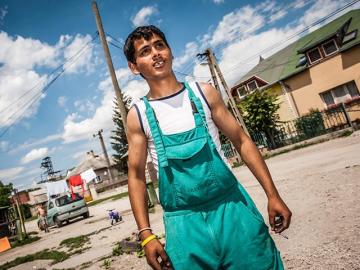“Why do Roma across Europe still face shocking levels of deprivation, marginalisation, and discrimination?” asks FRA Director Michael O’Flaherty. “These findings underline how EU and national laws and policies still do not deliver on the fundamental rights of Roma that will change their daily lives. They should inspire national policymakers to gather their own data to focus resources and efforts on addressing the intolerable plight too many Roma continue to face. FRA stands ready to support countries in collecting such data.”
The ‘Roma in 10 European countries’ report reveals little progress since FRA’s last survey in 2016 although there are some improvements:
- 80% of Roma interviewed remain at risk of poverty compared with an EU average of 17%, no change from before. 22% live in households with no tap water and 33% have no indoor toilet. But overall, Roma living in poor housing fell from 61% in 2016 to 52% now.
- 29% of Roma children live in households where someone went to bed hungry at least once in the previous month.
- 44% of Roma children attend early childhood education, almost no change from before. In comparison, often over twice as many children their age from the general population in the same country attend early childhood education.
- 43% of the Roma surveyed are in paid work, compared with the EU average employment rate of 72% for 2020.
- 25% of Roma feel they have been discriminated against in the past year in everyday situations such as looking for work, at work, housing, healthcare and education.
In addition, the findings also reveal a clear difference in life expectancy between Roma and the general population: Roma men and women live nine and 11 years less than people generally in the survey countries.
The survey findings indicate that despite national efforts, many countries still fall short of the targets set in the EU’s 10-year plan to support Roma, the EU Roma Strategic Framework on equality, inclusion and participation.
They serve as a baseline for assessing the effectiveness of the 10-year plan. They underline the need for countries themselves to regularly collect such data to take stock of how they are doing.
These results should help countries develop and assess more targeted measures in their national Roma strategies, particularly when it comes to addressing poverty, discrimination, education, employment, health and housing. Examples of measures include providing targeted education and training to help Roma youth and Roma women, better employment opportunities, as well as greater social protection to eradicate poverty.
The report is based on a survey that collected information in 10 European countries, derived from nearly 8,500 face-to-face interviews with Roma. It collected data on discrimination, victimisation and income and living conditions from over 20,000 household members.
FRA also surveyed Roma in 2008, 2011 and 2016, and Roma and Travellers in 2019.
For more, please see the findings Q&A or contact: media@fra.europa.eu / Tel.: +43 1 580 30 653
